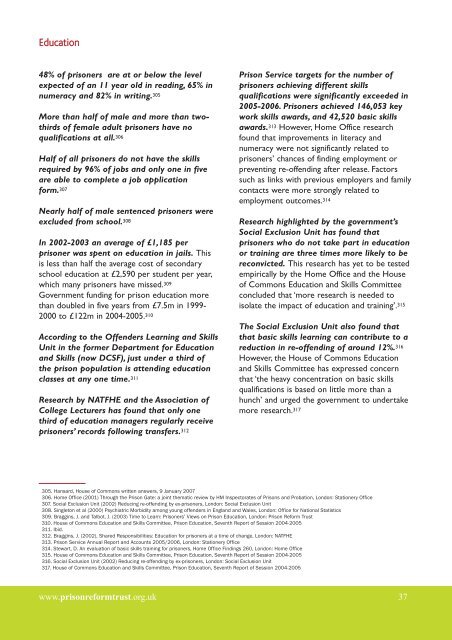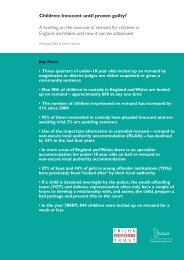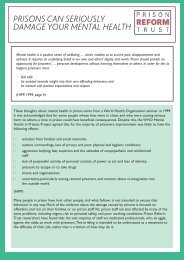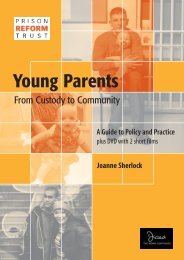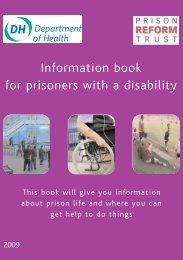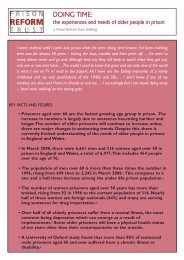BROMLEY BRIEFINGS PRISON FACTFILE - Prison Reform Trust
BROMLEY BRIEFINGS PRISON FACTFILE - Prison Reform Trust
BROMLEY BRIEFINGS PRISON FACTFILE - Prison Reform Trust
You also want an ePaper? Increase the reach of your titles
YUMPU automatically turns print PDFs into web optimized ePapers that Google loves.
Education48% of prisoners are at or below the levelexpected of an 11 year old in reading, 65% innumeracy and 82% in writing. 305More than half of male and more than twothirdsof female adult prisoners have noqualifications at all. 306Half of all prisoners do not have the skillsrequired by 96% of jobs and only one in fiveare able to complete a job applicationform. 307Nearly half of male sentenced prisoners wereexcluded from school. 308In 2002-2003 an average of £1,185 perprisoner was spent on education in jails. Thisis less than half the average cost of secondaryschool education at £2,590 per student per year,which many prisoners have missed. 309Government funding for prison education morethan doubled in five years from £7.5m in 1999-2000 to £122m in 2004-2005. 310According to the Offenders Learning and SkillsUnit in the former Department for Educationand Skills (now DCSF), just under a third ofthe prison population is attending educationclasses at any one time. 311Research by NATFHE and the Association ofCollege Lecturers has found that only onethird of education managers regularly receiveprisoners’ records following transfers. 312<strong>Prison</strong> Service targets for the number ofprisoners achieving different skillsqualifications were significantly exceeded in2005-2006. <strong>Prison</strong>ers achieved 146,053 keywork skills awards, and 42,520 basic skillsawards. 313 However, Home Office researchfound that improvements in literacy andnumeracy were not significantly related toprisoners’ chances of finding employment orpreventing re-offending after release. Factorssuch as links with previous employers and familycontacts were more strongly related toemployment outcomes. 314Research highlighted by the government’sSocial Exclusion Unit has found thatprisoners who do not take part in educationor training are three times more likely to bereconvicted. This research has yet to be testedempirically by the Home Office and the Houseof Commons Education and Skills Committeeconcluded that ‘more research is needed toisolate the impact of education and training’. 315The Social Exclusion Unit also found thatthat basic skills learning can contribute to areduction in re-offending of around 12%. 316However, the House of Commons Educationand Skills Committee has expressed concernthat ‘the heavy concentration on basic skillsqualifications is based on little more than ahunch’ and urged the government to undertakemore research. 317305. Hansard, House of Commons written answers, 9 January 2007306. Home Office (2001) Through the <strong>Prison</strong> Gate: a joint thematic review by HM Inspectorates of <strong>Prison</strong>s and Probation, London: Stationery Office307. Social Exclusion Unit (2002) Reducing re-offending by ex-prisoners, London: Social Exclusion Unit308. Singleton et al (2000) Psychiatric Morbidity among young offenders in England and Wales, London: Office for National Statistics309. Braggins, J. and Talbot, J. (2003) Time to Learn: <strong>Prison</strong>ers’ Views on <strong>Prison</strong> Education, London: <strong>Prison</strong> <strong>Reform</strong> <strong>Trust</strong>310. House of Commons Education and Skills Committee, <strong>Prison</strong> Education, Seventh Report of Session 2004-2005311. Ibid.312. Braggins, J. (2002), Shared Responsibilities: Education for prisoners at a time of change, London: NATFHE313. <strong>Prison</strong> Service Annual Report and Accounts 2005/2006, London: Stationery Office314. Stewart, D. An evaluation of basic skills training for prisoners, Home Office Findings 260, London: Home Office315. House of Commons Education and Skills Committee, <strong>Prison</strong> Education, Seventh Report of Session 2004-2005316. Social Exclusion Unit (2002) Reducing re-offending by ex-prisoners, London: Social Exclusion Unit317. House of Commons Education and Skills Committee, <strong>Prison</strong> Education, Seventh Report of Session 2004-2005www.prisonreformtrust.org.uk 37


